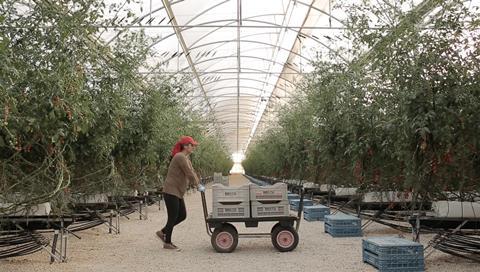Fepex puts lower volume down to adverse weather, drought, higher production costs and erosion of competitiveness

Spanish exports of fresh fruits and vegetables in 2023 decreased by 6 per cent in volume compared to the previous year to 11.3m tonnes, but grew by the same percentage in value, to reach €16.855bn, according to customs data.
Fepex said the lower volume was due to several factors, including adverse weather, drought, higher production costs and a decline in competitiveness compared to third countries.
Fruit exports fell 7.7 per cent on 2022 to 6.2m tonnes, while their value grew by 1 per cent to €8.972bn. The most notable falls were in citrus and berries, with strawberries down 11 per cent at 246,308 tonnes and blueberries down 15 per cent at 73,508 tonnes.
Exports of stonefruit increased across the board – peaches and flat peaches grew 25 per cent to 327,888 tonnes while nectarine exports were up 8 per cent. Watermelon exports remained stable at 678,822 tonnes.
Vegetable exports fell 3 per cent compared to 2022 to 5.2m tonnes, with declines across the main categories: pepper, lettuce, cucumber, tomato and cabbage. Pepper exports were down 11 per cent at 710,780 tonnes, lettuce fell 1 per cent to 706,760 tonnes, cucumber fell 4 per cent to 667,546 tonnes, tomatoes registered a fall of 11 per cent to 558,514 tonnes and cabbages were down 6 per cent to 469,804 tonnes. The total value of vegetable exports grew 11 per cent to €7.883bn.
The European Union took 83 per cent of Spain’s total volume – 9.4m tonnes. With the addition of the UK, Switzerland and Norway this rose to 97 per cent. The low presence of Spanish produce in non-European markets showed the difficulty exporters have in accessing these markets, Fepex said, noting that by contrast fruits and vegetables from third countries had little problem accessing the EU.
In 2023, imports increased by 7 per cent in volume and 19 per cent in value, totalling 4.1m tonnes and €4.473bn respectively. In the last five years imports have grown 28 per cent in volume and 51 per cent in value.
Fepex said the concentration of sales within the EU “reflects the importance of the European Commission’s policies for the future development of the sector, policies that must be in line with the productive reality of the Member States and clearly support the community preference”.



